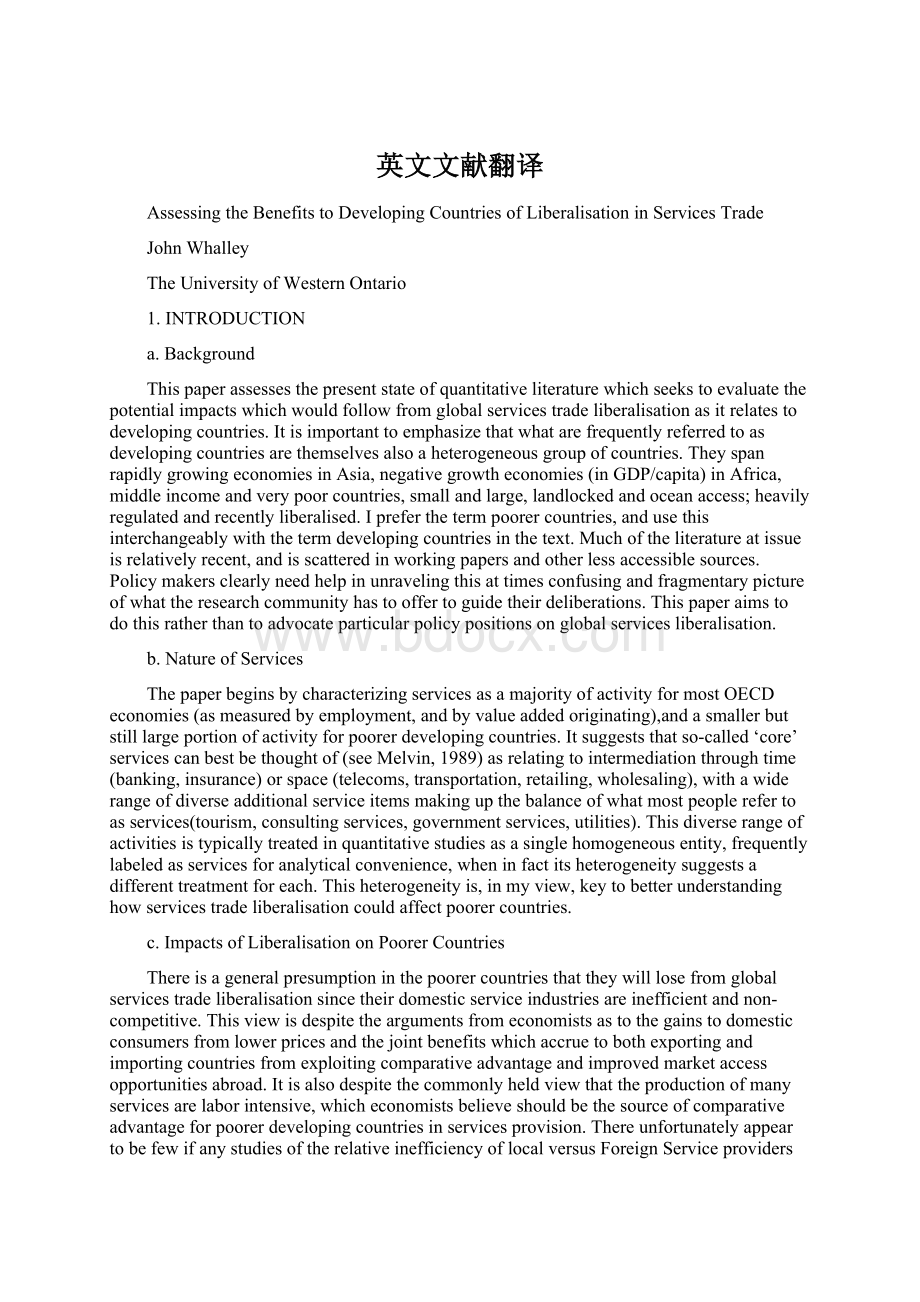英文文献翻译.docx
《英文文献翻译.docx》由会员分享,可在线阅读,更多相关《英文文献翻译.docx(11页珍藏版)》请在冰豆网上搜索。

英文文献翻译
AssessingtheBenefitstoDevelopingCountriesofLiberalisationinServicesTrade
JohnWhalley
TheUniversityofWesternOntario
1.INTRODUCTION
a.Background
Thispaperassessesthepresentstateofquantitativeliteraturewhichseekstoevaluatethepotentialimpactswhichwouldfollowfromglobalservicestradeliberalisationasitrelatestodevelopingcountries.Itisimportanttoemphasizethatwhatarefrequentlyreferredtoasdevelopingcountriesarethemselvesalsoaheterogeneousgroupofcountries.TheyspanrapidlygrowingeconomiesinAsia,negativegrowtheconomies(inGDP/capita)inAfrica,middleincomeandverypoorcountries,smallandlarge,landlockedandoceanaccess;heavilyregulatedandrecentlyliberalised.Ipreferthetermpoorercountries,andusethisinterchangeablywiththetermdevelopingcountriesinthetext.Muchoftheliteratureatissueisrelativelyrecent,andisscatteredinworkingpapersandotherlessaccessiblesources.Policymakersclearlyneedhelpinunravelingthisattimesconfusingandfragmentarypictureofwhattheresearchcommunityhastooffertoguidetheirdeliberations.Thispaperaimstodothisratherthantoadvocateparticularpolicypositionsonglobalservicesliberalisation.
b.NatureofServices
ThepaperbeginsbycharacterizingservicesasamajorityofactivityformostOECDeconomies(asmeasuredbyemployment,andbyvalueaddedoriginating),andasmallerbutstilllargeportionofactivityforpoorerdevelopingcountries.Itsuggeststhatso-called‘core’servicescanbestbethoughtof(seeMelvin,1989)asrelatingtointermediationthroughtime(banking,insurance)orspace(telecoms,transportation,retailing,wholesaling),withawiderangeofdiverseadditionalserviceitemsmakingupthebalanceofwhatmostpeoplerefertoasservices(tourism,consultingservices,governmentservices,utilities).Thisdiverserangeofactivitiesistypicallytreatedinquantitativestudiesasasinglehomogeneousentity,frequentlylabeledasservicesforanalyticalconvenience,wheninfactitsheterogeneitysuggestsadifferenttreatmentforeach.Thisheterogeneityis,inmyview,keytobetterunderstandinghowservicestradeliberalisationcouldaffectpoorercountries.
c.ImpactsofLiberalisationonPoorerCountries
Thereisageneralpresumptioninthepoorercountriesthattheywilllosefromglobalservicestradeliberalisationsincetheirdomesticserviceindustriesareinefficientandnon-competitive.Thisviewisdespitetheargumentsfromeconomistsastothegainstodomesticconsumersfromlowerpricesandthejointbenefitswhichaccruetobothexportingandimportingcountriesfromexploitingcomparativeadvantageandimprovedmarketaccessopportunitiesabroad.Itisalsodespitethecommonlyheldviewthattheproductionofmanyservicesarelaborintensive,whicheconomistsbelieveshouldbethesourceofcomparativeadvantageforpoorerdevelopingcountriesinservicesprovision.ThereunfortunatelyappeartobefewifanystudiesoftherelativeinefficiencyoflocalversusForeignServiceprovidersindevelopingcountryservicemarketswhichallowthestrengthoftheseargumentstobeevaluatedonempiricalgrounds.
Thiscautiontowardsglobalservicestradeliberalisationinthedevelopingworldseemstoreflecttwoconcerns.Oneisthegeneralassumptioninthedevelopingworldthatanyfuturenegotiatedgloballiberalisationofservicestradewillbelargelyonesidedintheresultsitwillyield.TheirbeliefisthatifnewWTOmultilateral(orevenregional)servicesliberalisationisnegotiated,developedcountryserviceproviderswilllikelygainsignificantlyimprovedaccesstodevelopingcountryservicemarkets,buttheconverse(significantlyimprovedaccessfordevelopingcountryserviceproviderstodevelopedcountryservicemarkets)willlikelynothappen.Asymmetryinnegotiatingpowerisonereasoncitedforthispossibleoutcome.ThepresumptionisthatthepresentregulatorystructureformostservicemarketsegmentswillremaininplaceinOECDcountries,andfewsignificantimprovementsinaccesstodevelopedcountrymarketsfordevelopingcountryserviceproviderswilloccur.Thisoutcome,forinstance,isreflectedinrecentUSbilateralagreements,includingtheUS-Chileagreement.
Inreality,throughtheprocessofongoingregulatoryreformintheOECD,changesareinfactbeingmadeinmarketaccessarrangementsfordevelopingcountryserviceproviders,thoughthesearenotnecessarilyreflectedinscheduledcommitmentsinGATSintheWTO.AnotherimportantandneglecteddimensiontothisconclusionisSouth-Southtrade,andthepotentialthatdevelopingcountrieshavemuchtogainfromliberalisationofmarketsinotherdevelopingcountries.Thepointisthatintermsofmodel-based(orquantitative)evaluationsoftheimpactsofservicestradeliberalisation,weregenuinetw